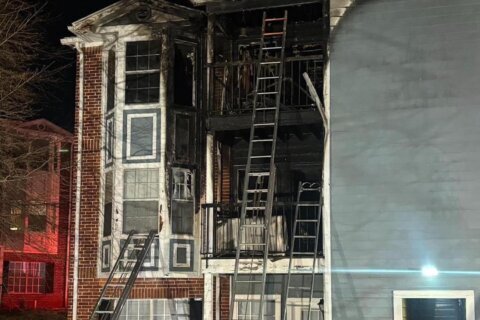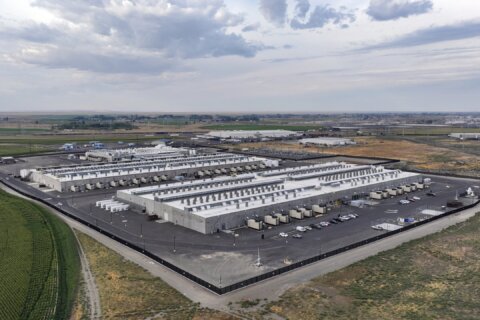
This article was republished with permission from WTOP’s news partner InsideNoVa.com. Sign up for InsideNoVa.com’s free email subscription today.
This article was written by WTOP’s news partner InsideNoVa.com and republished with permission. Sign up for InsideNoVa.com’s free email subscription today.
Prince William County officials will start crafting an ordinance allowing employees to form collective bargaining units.
The Board of Supervisors voted 5-2 to begin work on the ordinance during its meeting Tuesday.
Republican Supervisors Yesli Vega (Coles) and Jeanine Lawson (Brentsville) cast the dissenting votes. Gainesville Supervisor Pete Candland was absent.
The board’s vote starts work on the ordinance, which will be refined in coming months. The ordinance will govern how collective bargaining will work, which employees are eligible and the scope of bargaining.
In September, employees in the police and fire departments submitted petitions to the Board of Supervisors signaling their intent to collectively bargain.
Under new state law, the petition started a 120-day clock for the county to decide if it would start working on a collective bargaining ordinance.
Prince William’s police and fire departments have associations that act on behalf of members, but they are not formal unions.
State code had previously prohibited local governments from recognizing labor unions among its employees or entering into collective bargaining contracts with them. Employees for state agencies and constitutional officers are not included in the new legislation.
Alexandria and Arlington, Fairfax and Loudoun counties are the only localities in the state to establish collective bargaining ordinances this year. The processes in those localities were started by their governing bodies rather than employee petitions.
“There are four ordinances out there so we don’t have to recreate the wheel,” said Chair Ann Wheeler. “This is just the beginning of the process.”
A county staff report notes that a collective bargaining ordinance would have a “material” fiscal impact as 58.7% of Prince William’s $1.35 billion budget, excluding the transfer to the school division, is made up of personnel costs.
“[I]t is expected that collective bargaining agreements will result in employee associations advocating for higher benefits on behalf of their respective employee bargaining units and work rules that might require increased staffing levels,” the report says.
The county spends about $507.4 million per year on pay and benefits for employees, the report says.
Employee salary raises come in two forms: merit increases in January and June or a pay plan. A pay plan, or cost of living adjustment, raises salaries across the board on July 1 to meet market conditions.
In approving the budget for fiscal 2022, which ends June 30, the Board of Supervisors approved a 3% merit pay adjustment. The cost translated to a $8.2 million increase. If the board had approved a cost of living raise, it would have cost $12.3 million, the report says.
The staff report says that some employee groups have advocated for annual cost of living increases and merit raises. The report estimates such a plan could cost $20.4 million in the first year and $24.5 million in the second year, while pointing out those numbers are hypothetical.
To cover administration of ongoing collective bargaining, the county estimated it would cost $1.7 million to $3 million annually. The range depends on whether the ordinance would just cover wage and benefits or expand to all terms and conditions of employment.
Deputy County Executive Michelle Casciato estimated collective bargaining would require 14 new employees for administration.
Lawson emphasized the potential costs and was adamant that discipline power should fully remain with the county. Vega and Supervisor Victor Angry (Neabsco) also wanted discipline excluded from the ordinance.
“I have grave concerns about where we go with discipline,” Lawson said.
Vega didn’t support an ordinance, but wanted prohibitions on unions using public funding to support partisan campaigns. She said the county has a robust benefits package, but Lawson said collective bargaining is “always about money. It’s always about money. … It’s never enough.”
Supervisors Andrea Bailey (Potomac) and Kenny Boddye (Occoquan) said allowing collective bargaining would show the county cares about its employees.
“This is the right thing to do,” Bailey said, “because we need to appreciate who we have in place to serve.”
County staff are planning work sessions for January or February to hammer out the ordinance.
Several people spoke in favor of a collective bargaining ordinance during public comment at Tuesday’s meeting.
Richard Jessie said unions are essential to fight for employee rights.
“When there is no union, there is no one to fight for them,” he said.
Del. Elizabeth Guzman, D-31st, posted to Twitter Tuesday evening to call the board’s vote a “Great step toward giving our first responders and other county workers a voice on the job.”
“Our local government workers have for nearly two years labored on the frontlines of this pandemic to keep our county running and to ensure our community members are cared for,” Guzman said in a press release. “We are still battling this pandemic and for too long our frontline workers have been asked to sacrifice without meaningful recognition. It is not enough to clap for these heroes; they deserve the freedom to form a union and bargain collectively for a fair contract.”
David Broder, the president of SEIU Virginia 512, a union that represents public employees and home care workers across the state, applauded the board’s decision.
“Public employees understand the importance of a real seat at the table to transform jobs and improve public services, and so do residents,” he said in a press release. “With collective bargaining, county employees can collaborate with county leaders to ensure that all workers are respected, protected and paid a living wage for the essential work they do.”







